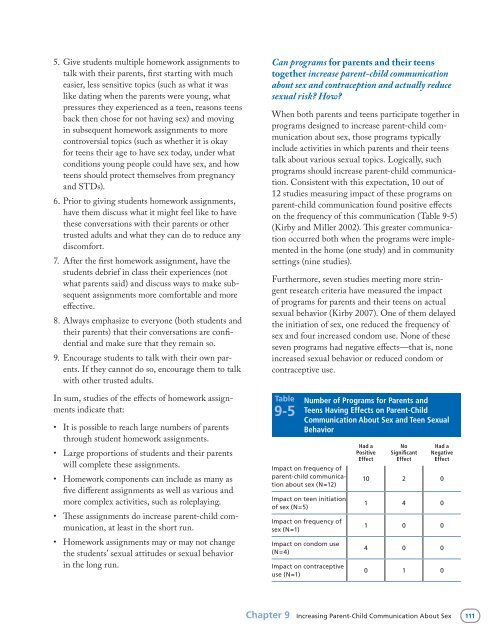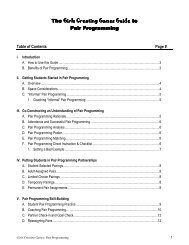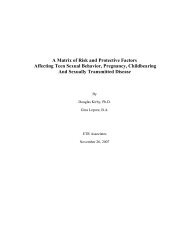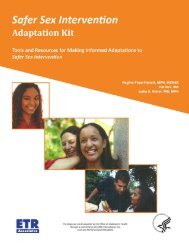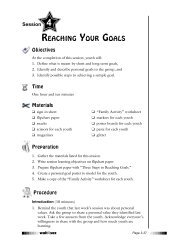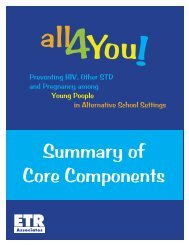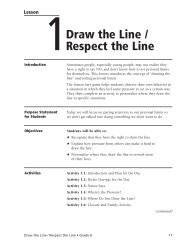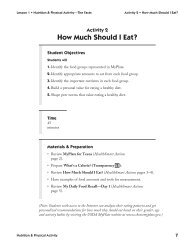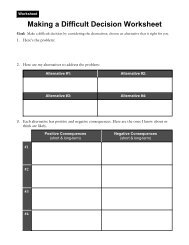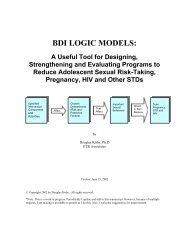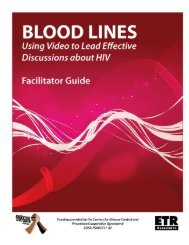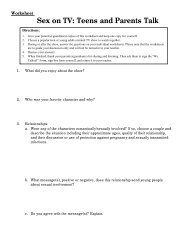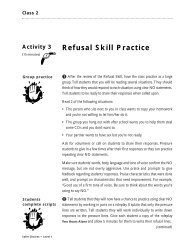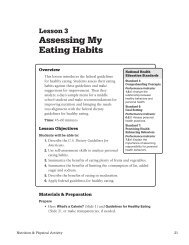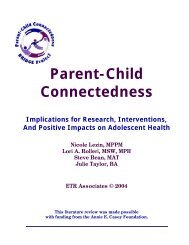Reducing Adolescent Sexual Risk: A Theoretical - ETR Associates
Reducing Adolescent Sexual Risk: A Theoretical - ETR Associates
Reducing Adolescent Sexual Risk: A Theoretical - ETR Associates
- No tags were found...
Create successful ePaper yourself
Turn your PDF publications into a flip-book with our unique Google optimized e-Paper software.
5. Give students multiple homework assignments totalk with their parents, first starting with mucheasier, less sensitive topics (such as what it waslike dating when the parents were young, whatpressures they experienced as a teen, reasons teensback then chose for not having sex) and movingin subsequent homework assignments to morecontroversial topics (such as whether it is okayfor teens their age to have sex today, under whatconditions young people could have sex, and howteens should protect themselves from pregnancyand STDs).6. Prior to giving students homework assignments,have them discuss what it might feel like to havethese conversations with their parents or othertrusted adults and what they can do to reduce anydiscomfort.7. After the first homework assignment, have thestudents debrief in class their experiences (notwhat parents said) and discuss ways to make subsequentassignments more comfortable and moreeffective.8. Always emphasize to everyone (both students andtheir parents) that their conversations are confidentialand make sure that they remain so.9. Encourage students to talk with their own parents.If they cannot do so, encourage them to talkwith other trusted adults.In sum, studies of the effects of homework assignmentsindicate that:• It is possible to reach large numbers of parentsthrough student homework assignments.• Large proportions of students and their parentswill complete these assignments.• Homework components can include as many asfive different assignments as well as various andmore complex activities, such as roleplaying.• These assignments do increase parent-child communication,at least in the short run.• Homework assignments may or may not changethe students’ sexual attitudes or sexual behaviorin the long run.Can programs for parents and their teenstogether increase parent-child communicationabout sex and contraception and actually reducesexual risk? How?When both parents and teens participate together inprograms designed to increase parent-child communicationabout sex, those programs typicallyinclude activities in which parents and their teenstalk about various sexual topics. Logically, suchprograms should increase parent-child communication.Consistent with this expectation, 10 out of12 studies measuring impact of these programs onparent-child communication found positive effectson the frequency of this communication (Table 9-5)(Kirby and Miller 2002). This greater communicationoccurred both when the programs were implementedin the home (one study) and in communitysettings (nine studies).Furthermore, seven studies meeting more stringentresearch criteria have measured the impactof programs for parents and their teens on actualsexual behavior (Kirby 2007). One of them delayedthe initiation of sex, one reduced the frequency ofsex and four increased condom use. None of theseseven programs had negative effects—that is, noneincreased sexual behavior or reduced condom orcontraceptive use.Table9-5Number of Programs for Parents andTeens Having Effects on Parent-ChildCommunication About Sex and Teen <strong>Sexual</strong>BehaviorImpact on frequency ofparent-child communicationabout sex (N=12)Impact on teen initiationof sex (N=5)Impact on frequency ofsex (N=1)Impact on condom use(N=4)Impact on contraceptiveuse (N=1)Had aPositiveEffectNoSignificantEffectHad aNegativeEffect10 2 01 4 01 0 04 0 00 1 0Chapter 9 Increasing Parent-Child Communication About Sex 111


